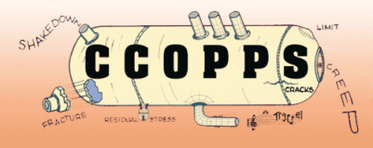CCOPPS
Certification of COmpetencies in the Power and Pressure Systems Industry

The Department of Mechanical Engineering at the University of Strathclyde has been awarded half a million Euros under the EU-funded Leonardo da Vinci Scheme for a 2 year project involving the C ertification of Co mpetencies in the P ower and P ressure S ystems Industry throughout Europe. The Leonardo da Vinci programme aims to stimulate innovation and enhance the competitiveness of European industry, through development in the skills of the workforce.
The power and pressure systems sector is one in which there is a particularly strong need for innovation and ongoing education and training. The European pressurised equipment market is estimated by manufacturer’s associations to be worth around EUR 65 billion. The facts clearly show that in order to face the challenge of the emerging countries, the European power and pressure systems community must introduce innovative products and processes and prepare for the challenges that new power generation technologies will bring. At this point in time, many EU governments are wrestling with the perceived unpopular decision of sanctioning the building of new nuclear power stations. Currently, nuclear energy is the largest source of power generation in Europe and there is a growing concern that renewable obligations and associated technologies will not be able to replace the capacity of ageing coal and nuclear power stations. Meanwhile, work progresses on all fronts, including wind, wave and tidal generation, as well as clean coal and Generation 4 nuclear. While Europe's future energy policies remain a hot topic of debate, it is apparent that analysis and simulation will be used to ensure that all technologies are as safe, cost-effective and environmentally-friendly as possible.
Education is at the heart of these challenges and this is the focus of CCOPPS . The project will be led by Dr. Jim Wood at the University of Strathclyde and involves the University of Stuttgart, Warsaw University of Technology, University of Malta, CETIM (France) and NAFEMS (UK). In conjunction with industry, the partners have produced an Educational Base consisting of competence statements, which in turn have guided the development of effective modules for work-based learning. The focus is staff and personal development for engineers involved in the growing use of analysis and simulation in this industry sector.
The CCOPPS project is a direct descendent of the successful FENET Thematic Network, which was led by NAFEMS and in which Strathclyde was also involved.



